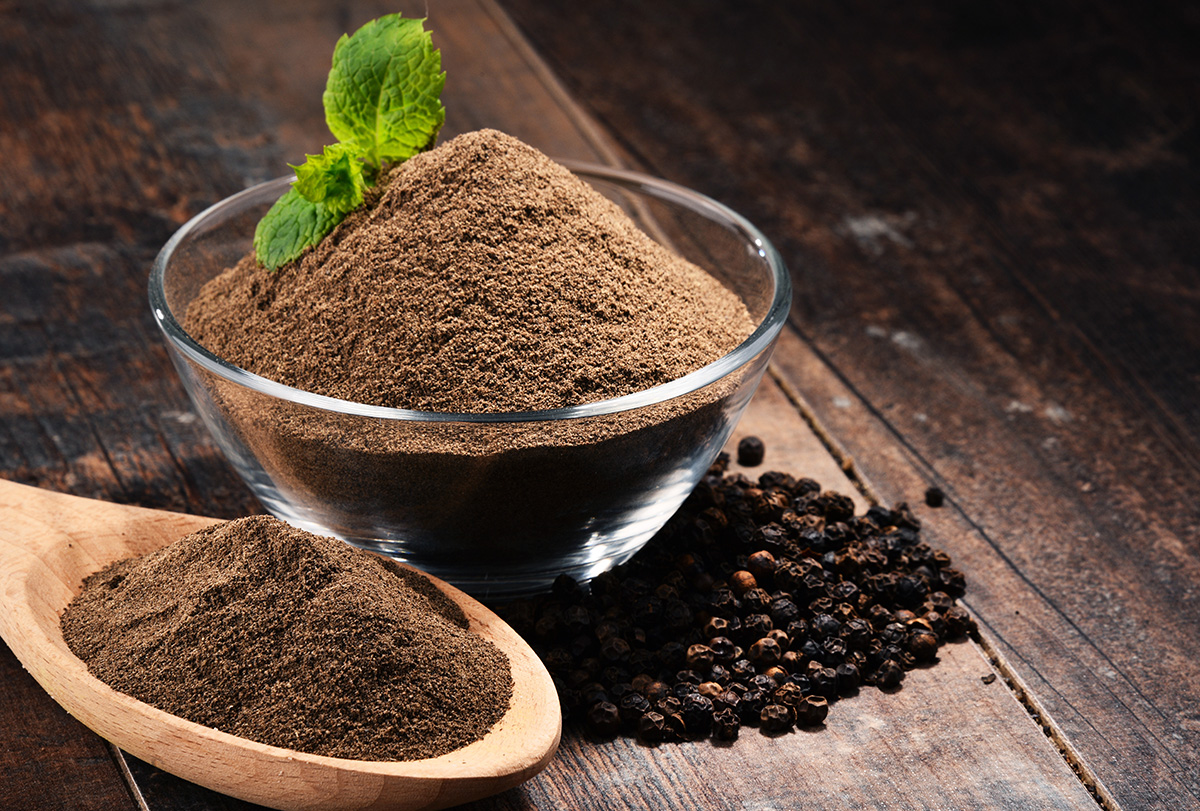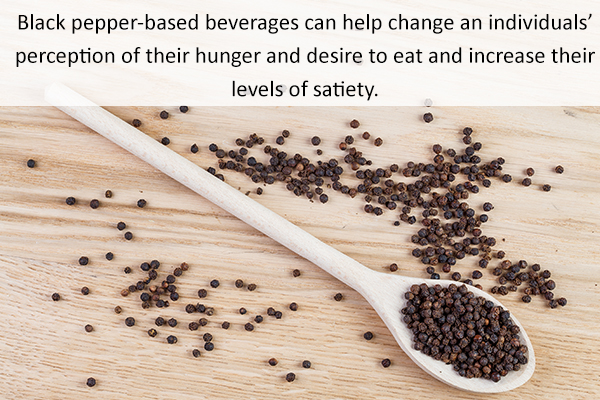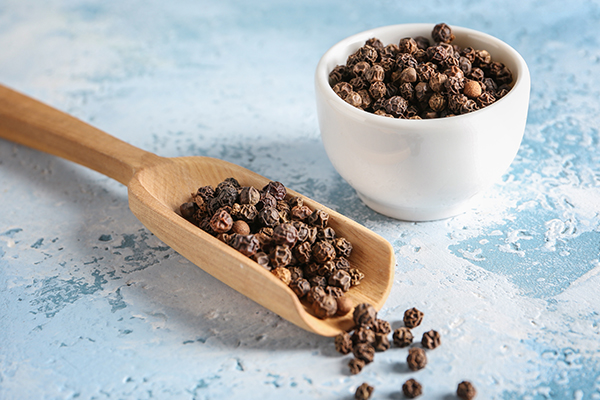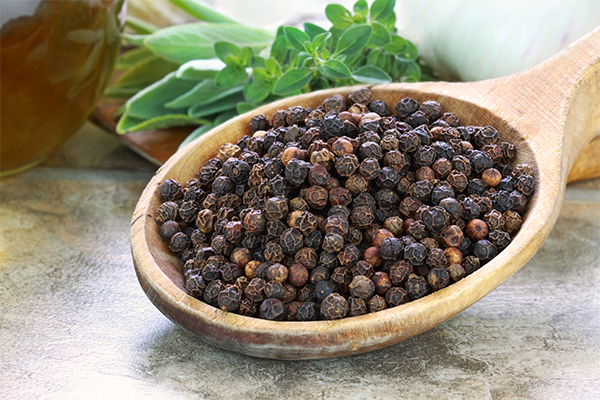In this article:
Piper nigrum, or black pepper, is a perennial climbing vine. The fruit from this vine produces green, black, and white peppercorns. Known as the king of spices, black pepper is highly flavorful and pungent. It is available in whole, cracked, and powder forms.

The compounds in peppercorns that provide the color, aroma, and flavor contain lignans, alkaloids, flavonoids, amides, and essential oils. Piperine present in peppercorns has antimicrobial properties and provides the characteristic heat found in pepper.
Nutritional Value of Pepper
Don’t let this commonplace spice fool you – pepper packs a lot of nutrients!
One teaspoon of ground pepper contains: (1)
- 5 calories
- 1 g of carbohydrate (half of which is fiber)
- Negligible fat and protein
- 8.7 mg calcium (1% of the daily value)
- 0.6 mg iron (3% of the daily value)
- 0.1 mg manganese (6% of the daily value)
- 3.3 mcg vitamin K (4% of the daily value)
Health Benefits of Black Pepper
Black pepper has been used in various cuisines and traditional medicines for centuries and is reported to help with a variety of health conditions.
Many of the medicinal and pharmacological activities of black pepper come from the alkaloid piperine, which has antioxidant and anti-inflammatory properties. (2)
However, more research is needed to validate these claims and determine the dosage for the efficacy of pepper and its extracts.
1. Aids in weight loss

Some people believe that pepper may aid in weight loss.
A 2018 study found that black pepper-based beverages could change the participants’ perception of their hunger and desire to eat and increased their reported levels of satiety. (3) However, a study stated that black pepper may give your metabolism a slight boost but not enough to affect your weight significantly. (3)
Black pepper may also promote proper stomach function and may aid digestion.
2. Helps decrease vitiligo
Vitiligo is a common skin condition characterized by the formation of pale, white patches due to the lack of melanin.
A study found that pepper extract, as well as the piperine and alkaloid found in pepper, may cause the formation of more melanin. An ointment with pepper extract showed some promise at decreasing vitiligo. (4)
3. Relieves gum problems
Piperine may help reduce inflammation that leads to periodontal or gum disease. (5) One study demonstrated the use of curcumin, piperine, and lycopene extracts for managing inflammatory diseases such as periodontitis and gingivitis. (6)
4. May aid in cancer prevention
A study found that piperine may stop the spread and survival of several types of cancer cell lines. (7) Another paper underscored the potential of piperine as a chemopreventative agent. (8)
5. Stimulates appetite
Although research shows that pepper may suppress your appetite, there is also some evidence that it may stimulate it. A study revealed that black pepper might stimulate the appetite by stimulating the sense of smell. (9)
6. Improves brain function
Animal studies have shown that black pepper is helpful in preventing Alzheimer’s disease. (10)(11) However, more research is needed to understand the mechanism of piperine and pepper extract on cognitive function.
7. Lowers blood pressure
Recent studies suggested that extracts from black pepper may help manage blood pressure.
The essential oils found in black pepper demonstrated antioxidant activity and acted as ACE inhibitors. (12) Another study done on rat models found that piperine prevented the increase of blood pressure by blocking calcium channels. (13)
8. Lowers blood sugar
Many cultures use black pepper to help manage diabetes, and recent animal-based studies have shown that compounds found in black pepper may help with blood sugar control. (14)(15)
9. Boosts nutrient absorption
Piperine also has bio-enhancing properties that boost nutrient absorption. For instance, resveratrol and curcumin have poor bioavailability; they tend to pass through the digestive system without being absorbed. (16)
Piperine improves the bioavailability of these compounds and stimulates the release of enzymes to help digest fat and carbs. (16)
Safety Information of Black Pepper

Black pepper is generally considered safe as long as it is enjoyed in moderation.
- Pepper that is taken in excess can accidentally get stuck in the lungs, causing coughing and breathing problems and may lead to serious issues in children.
- Pepper that gets in the eye can lead to redness, burning, and irritation.
- Pregnant and breastfeeding women should limit pepper to just the amount used in cooking or added to food to avoid the risk of miscarriage.
Drug Interactions With Black Pepper
The following medications may cause problems when taken together with pepper, so caution is needed. (17)
1. Anticoagulants
The piperine in black pepper has been shown to have blood-thinning properties. Therefore, if you are taking blood-thinning medication (anticoagulant), such as warfarin (Coumadin), you should avoid taking supplements with black pepper or piperine.
2. Diabetic medications
Piperine has also been shown to lower blood sugar. If you are on diabetic medication, refrain from taking black pepper or piperine supplements to avoid extremely low blood sugar levels.
3. Carbamazepine
Black pepper and piperine can increase blood flow to the digestive system, thus improving the absorption rate of carbamazepine. This higher absorption can lead to carbamazepine toxicity.
4. Other medications
Taking black pepper or piperine supplements can increase the risk of side effects of medications that are broken down by the liver. These medications include ketoconazole (Nizoral), itraconazole (Sporanox), lovastatin (Mevacor), fexofenadine (Allegra), and triazolam (Halcion).
Most-Asked Questions About Black Pepper

Are pink peppercorns different from black, white, and green peppercorns?
Pink peppercorns are, in fact, dried berries from the Brazilian pepper tree (Schinus terebinthifolia), which is not of the same plant family as peppers.
How to select and store peppers?
Look for peppercorns that are free of any blemishes and feel heavy and compact. They should be stored in a dark, dry, and cool environment inside an air-tight container. The shelf life of ground pepper is about 3 months, whereas whole peppercorns usually last indefinitely.
Can black pepper trigger an allergic reaction?
While it is common for people to cough or sneeze on inhaling pepper powder, an allergic reaction to it is rare. However, it may trigger asthma symptoms in patients with asthma.
Can you add black pepper to tea?
Black pepper is a valuable additive to your tea as you can extract the antioxidant properties in the leaves and peppercorns.
Is black pepper keto-friendly?
One tablespoon of ground black pepper has about 1 g net of carbohydrates, which can easily fit into a ketogenic diet.
Does adding black pepper to turmeric enhance curcumin’s activity?
It has been found that piperine can stop the body from excreting curcumin and, in effect, increases the compound’s effects.
Expert Answers (Q&A)
Answered by Alex Roberts, MS, CD (Registered Dietitian Nutritionist)
There have been studies on rats showing the hepatoprotective effects of the methanolic extract from black pepper fruits and piperine.
In one study, the administration of black pepper reduced the hepatic biomarkers TG, AST, ALT, ALP, and bilirubin in rats with ethanol-CCl4-induced hepatotoxicity. (18)
In the kitchen! Use black pepper when cooking to add flavor and spice to your food.
Both black and white peppers contain piperine, a chemical found in peppercorns. It has strong antioxidant and anti-inflammatory effects. Hence, black and white peppers offer similar health benefits.
However, the two have some differences in appearance, flavor, and shelf life. White pepper has a milder taste and can quickly become stale and lose its flavor, whereas black pepper has a more pungent flavor and can last a long time.
Black pepper is known as the “king of spices” and is used in ancient Ayurvedic medicine. (19) Many health benefits have been found with the use of black pepper. However, most studies are based on rat models, and much more human studies are needed.
Remember, black pepper can interact with certain prescription drugs and inhibit absorption. Check with your doctor if you consume high doses of black pepper.
Final Word
Black pepper is a popular spice and is important in trade and culinary use for centuries. This spice also contains many nutrients and powerful compounds. Piperine is an alkaloid in black pepper and has been shown to exhibit therapeutic properties.
- Was this article helpful?
- YES, THANKS!NOT REALLY


